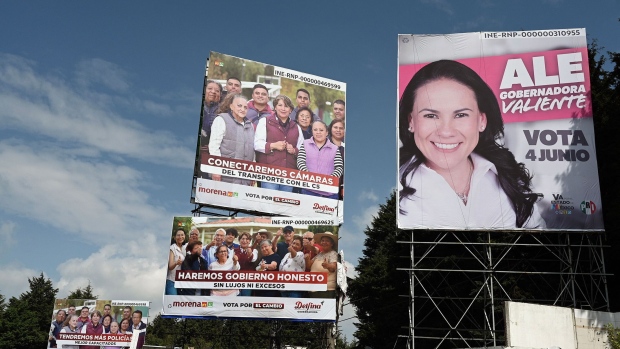Jun 4, 2023
Key Mexico State Votes in Election Poised to Boost AMLO’s Party
, Bloomberg News

(Bloomberg) -- Mexican President Andres Manuel Lopez Obrador’s ruling party Morena clinched one of the last bastions of opposition power in Sunday’s elections, flipping a governorship that could be an asset before the 2024 presidential election.
Former national Education Secretary Delfina Gomez will be the first female governor of the State of Mexico, according to a preliminary data count that showed her 8.3 percentage points ahead of her rival with 99% of the vote counted. Her opponent Alejandra Del Moral conceded as the the gap became clear in early results.
Mexico State, home to far more voters than any other, has essentially been controlled by the Institutional Revolutionary Party, known as the PRI, for nine decades. Some of the party’s most notable leaders, including former President Enrique Peña Nieto, got their start there.
The state’s mix of affluent and working-class neighborhoods often make it a bellwether of how Mexicans might vote in general elections. It’s the first time it picks a Morena party leader.
“Looking forward to the presidential succession, Morena can now claim to have defeated the longest-lasting PRI elite,” said Juan Carlos Villarreal, a political science professor in Toluca, the state capital. “It has a symbolic value for Morena and for the people who voted.”
In recent years, Morena has slowly collected the governorships of the majority of states, leaving only a handful controlled by other parties.
“For the opposition, staying united is now a matter of life or death. if they don’t do it, they’ll be wiped out in 2024,” said Jorge Buendia, the director of the Buendia & Marquez polling company. Before the vote, the PRI controlled only three governorships of 32 in total nationwide. Morena controlled 20.
Some polls had predicted an even bigger margin for Gomez, which if borne out by the results would give the president’s party additional power before the general elections in June 2024. Morena is considered to have a strong chance of having its candidate win then.
Lopez Obrador, known as AMLO, is ineligible in next year’s contest as the country’s constitution limits presidents to a single term.
Nationwide, the peso is stronger than it was before, social program have been enacted, and the minimum wage has been raised so “there’s a certain segment of the population that is satisfied,” Villarreal said.
Crime, water shortages, and the scarcity of well-paid jobs were important issues in the election, said Nahum de la Puente, an analyst at Ventum Consultores, who has also worked in state government.
Voters also cast ballots on Sunday for the governorship in the less-populated Coahuila State, where the PRI had a better chance of fending off challengers according to polls.
Manolo Jimenez Salinas from the opposition coalition won the state with 56.9% of the vote, beating Armando Guadiana, who obtained 21.5%, according to the preliminary vote count on Monday.
Polls opened at 8 a.m. local time and closed at 6 p.m. on Sunday in both of the states.
--With assistance from Leda Alvim and Amy Stillman.
(Updates data in second paragraph, adds analysis in eighth, vote count in thirteenth)
©2023 Bloomberg L.P.






